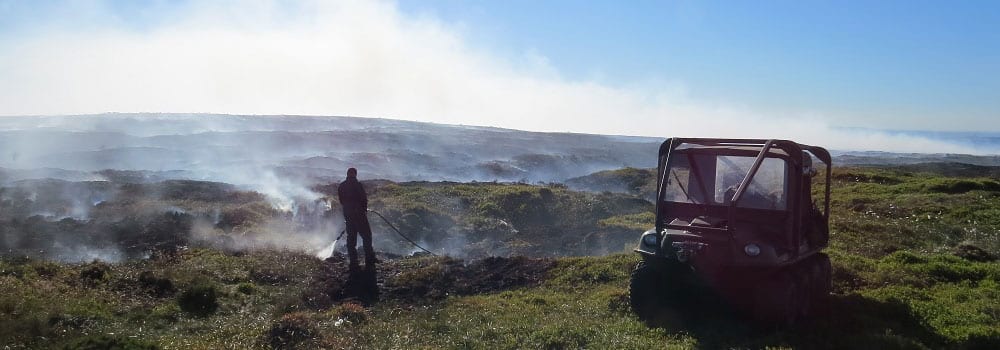The Burning Issue
The British Association for Shooting and Conservation (BASC) welcomes the recent Land use report ‘Policies for a Net Zero UK Committee on Climate Change’ and its overall objectives to reduce land-based emissions to enable the UK to achieve our net-zero target. BASC, however, holds deep reservations concerning the report’s recommendation to ban all ‘rotational burning’ over peat.
Banning all controlled burning over peat will not help achieve net-zero carbon targets, it will in some cases do the reverse and increase the risks of carbon emissions by increasing the likelihood of damaging wildfires.
BASC is very clear that controlled burning of vegetation in the uplands is an essential tool in wildfire management and mitigation. Burning can increase biodiversity. Its use is highly site dependant and, therefore, it is incorrect to say that you should always burn or never burn. In 2018, BASC told the government how land management for shooting prevents wildfires and provided a copy of its white paper Grouse Shooting and Moorland Management.

The latest report oversimplifies burning as a tool only used to benefit grouse shooting, it does not consider the benefits of burning as a restoration management practice or how it is an effective way of reducing the risk of damaging wildfires.
The limited research into burning as a management tool has resulted in extremely wide-ranging sets of conclusions. There is a concern that policy has over relied on individual studies that many consider flawed.
A recent paper in the Journal of Applied Ecology identified such a study and found “significant overlooked flaws” in the project design. It stated that the findings of the project were currently unreliable, and conclusions should be treated with caution by policy-makers who “need to re-examine the strengths and limitations of the prescribed burning evidence base”.
BASC supports others forms of habitat management where possible, including mowing and grazing and believes that the shooting community are and can continue to be a key resource in restoring peatlands. BASC is committed to supporting gamekeepers and other organisations in peatland restoration projects. The net-zero target should not be high-jacked by anti-shooting extremists to place pressure on policy makers to make knee jerk reactions that are not considering the bigger picture or latest scientific research.
“A blanket ban on burning vegetation across our precious peatlands removes a vital tool from the land manager’s toolbox.”
Image by Trevor Martin
The devastating uncontrolled wildfires across the UK uplands in 2018/19 demonstrate how vulnerable these habitats are to wildfire. With climate change likely to add to the wildfire risk all options need to remain open. An uncontrolled wildfire can be devasting, reaching incredible temperatures, igniting the peat below and burning for weeks releasing thousands of tonnes of carbon into the atmosphere. It damages protected habitats and species and puts human lives in danger. Well-managed cool burns reduce the fire fuel load protecting the peat below.
The latest research also shows that controlled burning can lock in carbon as charcoal, increase the species diversity of carbon sinking sphagnum mosses and has reduced methane outputs (a climate change contributor) when compared to mowing. Controlled burning can under the right circumstances protect peatland and help achieve our net-zero target.
